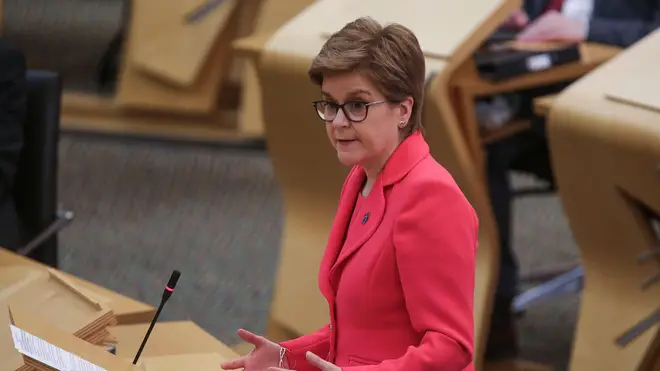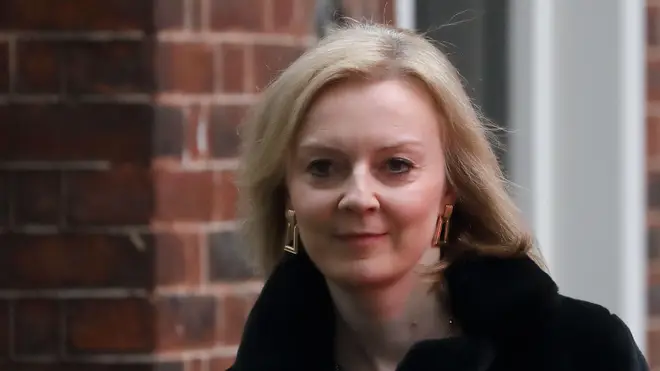
Simon Marks 3pm - 7pm
27 January 2022, 16:09 | Updated: 27 January 2022, 16:12

Nicola Sturgeon has accused the Equality and Human Rights Commission of misrepresenting the reforms the Scottish Government wants to make to the Gender Recognition Act and criticised the UK-wide body for changing its position on the issue.
The EHRC has written to ministers urging them to undertake "more consideration" of its planned changes to the GRA - sparking accusations from Scottish LGBT organisations that it is nothing more than a mouthpiece of the UK Conservative government.
And at First Minister's Questions in Holyrood, Nicola Sturgeon said the EHRC had "obviously changed its position" reading out its previous support for reform during consultations.
The Scottish Government is due to bring forward draft legislation next month, which could introduce a process of "self-identification" which would allow transgender people to avoid two years of "living as" the gender they believe they are and a medical diagnosis of gender dysphoria. It could also lower the age of applicants to 16.
The UK government had considered similar changes in England, but women and equalities minister Liz Truss rolled back on the idea. Instead the reforms were aimed solely at reducing the cost and bureaucracy of the process.
Read more: Scotland to relax strict work from home guidance from Monday

Yesterday Baroness Kishwer Falkner, chair of the EHRC, wrote to SNP equalities minister Shona Robison, saying it was important to consider "the potential consequences for individuals and society of extending the ability to change legal sex from a small defined group, who have demonstrated their commitment and ability to live in their acquired gender, to a wider group who identify as the opposite gender at a given point".
She also said that the "established legal concept of sex, together with the existing protections from gender reassignment discrimination for trans people and the ability for them to obtain legal recognition of their gender, collectively provide the correct balanced legal framework that protects everyone".
Today Nicola Sturgeon responded to the EHRC's shift in position and added: "I'm also slightly concerned at some of what I consider doesn't accurately characterise the impact of the Bill. What the Bill will seek to do is simplify an existing process. It doesn't confer any new rights on trans people nor does it change any of the existing protections in the Equality Act.
"It doesn't change the current position on data collection or the ability of sports organisations to take decisions, for example, so we'll continue to engage with a range of organisations.
"But let me stress again, this is a Bill that is designed to simplify an existing process, to reduce the distress, the trauma and anxiety and often the stigmatisation that trans people suffer in our society."
The EHRC letter also sparked accusations that it and Baroness Falkner are not independent of the UK Government.
She was appointed as chair in December 2020, and under her leadership the EHRC has been criticised by trans and LGBT organisations following comments she made to The Times, saying women had the right to question transgender identity without fear of abuse, stigmatisation or loss of employment.
Tim Hopkins of the Equality Network - which runs the Scottish Trans Alliance - said the EHRC board is "directly appointed by Liz Truss and the UK government. We assume that their appointees are responsible for this letter and for failing to stand up for equality for trans people".
He added: "We do not need UK government appointees telling us in Scotland how to legislate in devolved areas. And we look forward to the Scottish Government proceeding with this legislation soon as has been promised many times."
However the EHRC letter was welcomed by Scottish women's groups, who recently raised concerns that an SNP manifesto pledge from last May's election, that they would be met with to discuss the GRA reforms, was not being met.
Policy analysis group MurrayBlackburnMackenzie said the letter was "serious and substantial".
It added: "The Commission echoes concerns that have been put repeatedly to the Scottish Government by grass-root groups about the impact of reform on a range of policy areas, including data collection, legal protections for women, and criminal justice.
"We urge Ministers now to honour the SNP’s 2021 manifesto commitment to work with a range of stakeholders, and follow the Commission’s advice to undertake further detailed consideration before any change is made to the provisions in the existing Act, rather than press on with legislating for the self-declaration of sex."
A Scottish Government spokesperson said: "We will consider the EHRC's views, which have changed from their response to the 2019 consultation, along with those of others ahead of introduction of the bill.
"We appreciate the range of views on proposals to reform the Gender Recognition Act. We have always been keen to seek consensus where possible, and to work to support respectful debate, and will continue to do so."